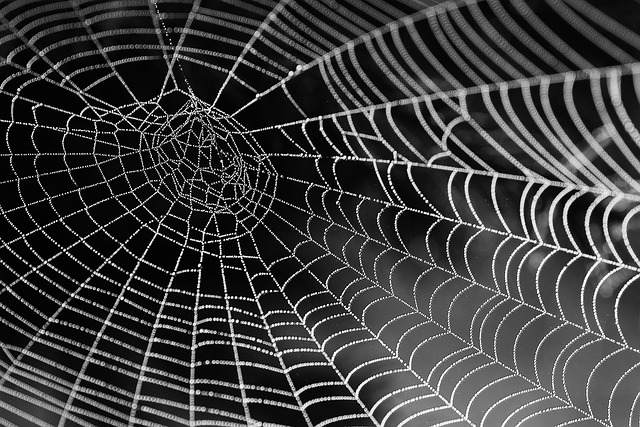Professional spider control offers effective prevention strategies for both residential and commercial spaces, focusing on sealing entry points, improving ventilation, addressing moisture issues, and using eco-friendly solutions. Homeowners can also implement DIY methods like regular cleaning, clutter reduction, natural repellents, and thorough inspections to prevent spider infestations. These measures aim to remove attractants, create an unwelcoming environment for spiders, and maintain a safe, spider-free living or working space without harmful chemicals.
Tired of sharing your space with unwanted eight-legged friends? Understanding and reducing spider attractants is key to achieving effective spider infestation prevention. This guide offers a comprehensive approach to tackling the issue head-on. From unearthing the secrets behind professional spider control methods to discovering eco-friendly solutions, you’ll gain valuable insights into spider behavior and learn practical tips for spider-proofing your home or business. Implement these strategies to reclaim your spaces from arachnid visitors.
Understanding Spider Behavior: Key Factors Attracting Spiders to Your Property
Understanding Spider Behavior: Key Factors Attracting Spiders to Your Property
Spiders are essential contributors to a healthy ecosystem, but when they invade your property, it can signal an underlying problem. Professional spider control experts emphasize that these arachnids are drawn to specific factors, offering valuable insights for effective spider infestation prevention. One of the primary attractants is food sources, such as insects and other small creatures, which spiders rely on for sustenance. Therefore, maintaining a clean environment by regularly eliminating potential food sources can significantly deter spiders.
Additionally, spiders are attracted to dark, secluded spaces and moisture-prone areas. In residential settings, this might include cracks in walls, attics, and basements, while commercial properties may face challenges with spider prevention in storage rooms or outdoor areas. Implementing eco-friendly spider prevention solutions, like sealing entry points, improving ventilation, and addressing moisture issues, can make your space less appealing to these creatures. These spider prevention tips not only help in spider-proofing your home but also ensure a safer, more comfortable living or working environment.
Professional Spider Infestation Prevention: Strategies for Effective Control
Professional Spider Infestation Prevention: Strategies for Effective Control
When it comes to spider infestation prevention, professional services offer a comprehensive approach tailored to your specific needs. Commercial spider control services employ advanced techniques and eco-friendly solutions to eradicate spiders from residential or commercial spaces. These methods include meticulous inspections, targeted treatments, and the use of modern equipment designed to reach hard-to-access areas where spiders often hide. By addressing the root causes, such as moisture issues, inadequate ventilation, and pest invasions that attract spiders, these services provide lasting protection against future infestations.
For effective spider prevention tips, consider implementing a multi-layered strategy. Seal entry points like cracks, gaps around doors and windows, and other potential access points using caulk or weatherstripping. Regularly clean and vacuum your space, paying close attention to corners and under furniture. Maintain good hygiene practices by promptly cleaning up spills and removing clutter, as spiders are drawn to these environments. Additionally, spider-proofing your home involves storing items in airtight containers, cutting off branches that touch your roof (to prevent easy access), and maintaining a tidy yard free of debris or potential hiding spots.
Eco-Friendly Spider Prevention Solutions: Safe and Sustainable Methods
When it comes to dealing with spiders, many homeowners opt for professional spider control services due to the sheer difficulty in spider infestation prevention. However, there’s a growing trend towards eco-friendly spider prevention solutions that not only keep these arachnids at bay but also ensure a safe and sustainable environment. These methods focus on eliminating attractants rather than killing spiders directly.
One effective eco-friendly spider prevention tip is maintaining a clean and clutter-free space, especially in areas prone to moisture build-up. Spiders are drawn to dark, secluded places where they can hunt undisturbed, so regular inspections and thorough cleaning of corners, crevices, and under furniture can significantly deter them. Using natural repellents like citrus oils or lavender also shows promise in spider prevention tips, offering an alternative to chemical pest control for spiders. Additionally, sealing entry points and cracks with appropriate materials prevents them from spinning webs and entering homes or commercial spaces. These residential spider prevention strategies can be scaled up for commercial spider control services, ensuring a spider-free environment without resorting to harsh chemicals.
Spider-Proofing Your Home and Business: Long-Term Tips for Residential and Commercial Settings
Spider infestation can be a common and unsettling issue, whether in your home or business premises. To prevent these eight-legged intruders from taking over, implementing long-term spider control measures is key. Professional spider control services offer expert advice tailored to residential and commercial settings, ensuring effective and lasting results.
One of the primary aspects of spider-proofing involves identifying and eliminating attractants. This includes maintaining a clean environment by regularly vacuuming and dusting to remove webbing and dead insect remains that may lure spiders. Sealing entry points such as cracks, gaps in walls, or spaces around utility pipes can also significantly reduce their access. Additionally, using eco-friendly spider prevention solutions like natural repellents or specific plant essential oils can be an effective, non-toxic approach to deter them without causing harm to people or pets.
By understanding spider behavior and implementing tailored prevention strategies, you can significantly reduce the likelihood of a spider infestation. For severe cases or unique circumstances, professional spider control offers effective solutions. Alternatively, eco-friendly methods provide a safe and sustainable approach to spider prevention. Whether for residential or commercial settings, these comprehensive tips ensure a spider-free environment while maintaining a healthy balance with nature. Incorporate these practices into your routine maintenance to enjoy a peaceful space free from arachnid intruders.
